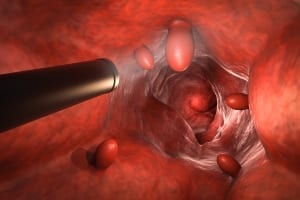 Colonoscopy is a highly successful method used for diagnosing diseases of the colon. At a leading private hospital, Herzliya Medical Center (HMC), experts provide patients with the highest quality gastroenterological diagnostic procedures in Israel. Modern endoscopic techniques are applied for both diagnosis and treatment of pathologies associated with the gastrointestinal tract.
Colonoscopy is a highly successful method used for diagnosing diseases of the colon. At a leading private hospital, Herzliya Medical Center (HMC), experts provide patients with the highest quality gastroenterological diagnostic procedures in Israel. Modern endoscopic techniques are applied for both diagnosis and treatment of pathologies associated with the gastrointestinal tract.
What is a colonoscopy?
A colonoscopy is the visual examination of the mucous membrane of the large intestine, from the anus to the ileocecal valve (connects the large to the small intestine). The procedure is performed using a flexible optical instrument equipped with a powerful light source. This light source allows for a thorough inspection of the entire surface of the intestinal mucosa, detecting slight surface changes, as well as any abnormality of anatomical structure (such as diverticula).
Benefits of colonoscopy at HMC in Israel
- Leading gastroenterologists in Israel carry out numerous diagnostic and treatment procedures in gastroenterology and digestive diseases
- The procedure is painless and carried out with the patient under sedation
- Innovative technology- The diagnostics department at Herzliya Medical Center in Israel uses the most advanced medical equipment
- Procedures are conducted in a timely and efficient manner; results of the surgery are delivered to patients in the shortest time possible
High-quality service – HMC’s personal support coordinators assist patients throughout the process of their diagnosis.
Endoscopic Colonoscopy in Israel
Endoscopic colonoscopy, in contrast to less-invasive techniques (virtual colonoscopy), is a surgical procedure that is performed with the intent to remove colon polyps and obtain tissue samples from potentially cancerous lesions (biopsy). Through biopsy, the achievement of differential diagnosis as early as possible is made easier through this method and largely important for the possibility of starting treatment colon cancer before it develops further. Leading centers of gastroenterology in Israel recommend this procedure, although slightly more invasive, in order to best diagnose the health of the colon and avoid contraindications.
When to get a colonoscopy
- Suspected inflammation and/or swelling in the colon- associated regions
- Diagnosis of diverticulosis and diverticular disease – diverticulitis
- Observed anatomical disturbances in the gastrointestinal tract
- Anemia diagnosed through positive test result of fecal blood test
A colonoscopy is often part of diagnostic processes routinely carried out for the early diagnosis of colon cancer for evaluation by medical professionals, who consider the results of screening along with that of the patient’s age and genetic risk factors. Colon cancer screening guidelines include people at the age of 50 and above who have colonoscopy among other procedures to test for polyps and colon cancer. Those who are high at risk of developing colon cancer (including below the age of 50), and who have a family history of polyps or colon (colorectal cancer or bowel cancer), or hereditary non-polyposis colon cancer (HNPCC) should have a colonoscopy. Consult a gastroenterologist at HMC to determine if you require a colonoscopy.
Colonoscopy procedure at HMC
The endoscopic colonoscopy procedure requires preparation on behalf of the patient before the start of surgery. The most important aspect of preparation is the emptying of the colon, which is necessary for the procedure to yield accurate results. A few days before the procedure, patients are advised to consume a low fiber diet. The day before the procedure, preliminary screening requires the patient to consume only liquids for a short period. To aid in clearing the colon of its contents to prepare for surgery, patients are given laxatives to clear bowels of stool.
It is essential that patients inform their doctor about any associated diseases, medications, as well as any known allergies. Specialists of gastroenterology at HMC in Israel provide patients with detailed information on specific processes that are necessary for patients, in order to reduce blood clotting.
The colonoscopy procedure begins after an intravenous sedative is administered to the patient. This sedative relieves stress and decreases muscle tone. A lubricant (grease) is applied to the area of examination, which allows the endoscope to safely pass through the large intestine. During the procedure, the intestine is enlarged by a flow of air through the colon for a better view across the mucosal surface. This may cause only a temporary feeling of discomfort that quickly passes after the scan. Any tissue samples obtained during the procedure are sent to the laboratory for further analysis.
When the procedure is complete, some patients experience drowsiness as the sedative subsides. Patients are prohibited from operating a motor vehicle for a few days post colonoscopy.
Endoscopic colonoscopy procedures at Herzliya Medical Center in Israel have minimal risk of complication. Experts years of clinical experience and gastroenterologists at Herzliya Medical Center’s private hospital guarantee the most efficient and safe procedures.
 Patients Log In
Patients Log In 










